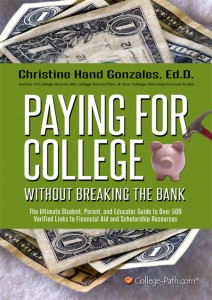Guest blogger, Felicia Gopaul, is the President of College Funding Resource (CFR), teaches families how the financial aid system works. She shared the following article about getting a jump start on the the scholarship search.
Resource (CFR), teaches families how the financial aid system works. She shared the following article about getting a jump start on the the scholarship search.
Smart students don’t wait to start looking for scholarships until the fall of their senior year in high school (or later). They get started much earlier than that. In fact, many successful scholarship recipients start looking for scholarships as early as the spring semester of their sophomore year in high school.
Why start your scholarship search so early?
Starting your scholarship search early is smart. It allows you time to get organized and leisurely put together a list of scholarships you want to apply for in your senior year. It also allows you to complete any summer programs that you might have to attend in order to qualify for a scholarship.
For example, the New Jersey chapter of the National Association of Black Accountants has a summer Accounting Awareness Program (ACAP) that a student must complete in order to be eligible for a scholarship later. By starting your scholarship search early, you have a few more summers to find and fulfill the requirements for programs like ACAP. Starting early means you won’t find yourself ineligible for a scholarship because you did not know or have time to complete the requirements for qualification.
But the qualification is not the only hurdle.
Getting started early really matters.
You should start your scholarship search by talking to your high school guidance counselor. Your guidance counselor will have information about scholarships that prior students have won which you can use as a starting point for your scholarship list. In addition, local organizations will often send scholarship information to the area high schools. Since your scholarship application is most competitive at the local level, you will find more scholarships that you are more likely to win by starting with the list of scholarships your guidance counselor provides.
Getting started early reduces the competition dramatically.
You are more likely to win a local scholarship because there will be fewer potential applicants who are applying for the same scholarship. At the local level, you are competing for a scholarship against other students at your high school, in your school district or county. A local scholarship will often have less than 10 – 15 other students competing for a scholarship.
There are fewer potential applicants at the local level because scholarship awards are generally smaller. Many students make the false assumption that going after a $250, $500 or even $1000 scholarship is not worth their time. It’s often easier to get 10 – $500 scholarships from local organizations than a $5,000 scholarship from a national scholarship where you are competing against some of the smartest students in the nation.
But I don’t really have time to apply for local scholarships…
That’s correct. Most students are strapped for time. But since you will also be applying to colleges at the same time you are applying for scholarships, much of the information you’ve gathered for your college applications can be used to complete your scholarship applications. Having the information you need at hand will help you save time when completing scholarship applications. The reward of securing several local scholarships will more than offset the 2-3 hours per scholarship application you have invested.
What should I do now?
- Begin your scholarship list with scholarships won by former students at your high school.
- Compile a list of scholarships you would like to apply for in your senior year.
- Determine if there are requirements you need to complete prior to applying for any of the scholarships and make a plan to fulfill the requirements prior to submitting your applications.
- Plan to apply for local scholarships where you are most competitive.
- Finally, investing even a couple of hours in applying for a local scholarship can translate to a great return on your investment of time.
Felicia Gopaul is the President of College Funding Resource (CFR). CFR teaches families how the financial aid system works and how to use that knowledge to reduce their out-of-pocket cost of college. For more information call 877-895-0506 or visit: www.CollegeFundingResource.com.
 An excellent guide to financial planning and scholarship search resources is “Paying for College Without Breaking the Bank: The Ultimate Student, Parent and Educator Guide to Over 500 Verified Links to Financial Aid and Scholarship Resources” by Dr. Christine Hand Gonzales. It’s available in paperback or eBook formats.See Amazon.com – http://tinyurl.com/d6b7onr or Barnes and Noble – http://tinyurl.com/nlxddw2.
An excellent guide to financial planning and scholarship search resources is “Paying for College Without Breaking the Bank: The Ultimate Student, Parent and Educator Guide to Over 500 Verified Links to Financial Aid and Scholarship Resources” by Dr. Christine Hand Gonzales. It’s available in paperback or eBook formats.See Amazon.com – http://tinyurl.com/d6b7onr or Barnes and Noble – http://tinyurl.com/nlxddw2.
.


